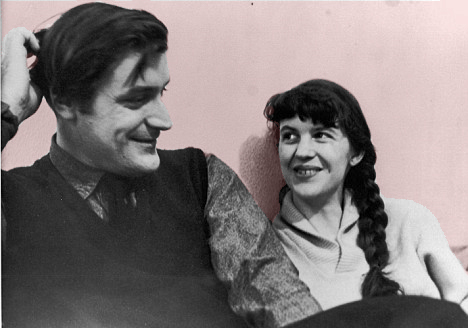
The following is from a series of adoring, playful and passionate letters that Ted Hughes wrote to Sylvia Plath in October of 1956. At the time, Plath had just resumed her studies at Cambridge, while Hughes was staying in his parents’ house in Yorkshire (where the newly-weds had spent the month of September).
October 18, 1956, Yorkshire
My dearest Sylvia—
No news yet. Another delicious letter from my kiss puss. What’s happened to your dreams? Probably now you’ve started writing all that out, you have—as you say—exorcised it, or at least got it under control. Perhaps it’s been pushing and glooming and corrupting your imagination for long enough. But if you keep up a detailed vivid looking at things, and not at all things, your dreams will go on improving, till you’re the angel of your own paradise. Try writing them out each morning.
Don’t be taken back by those rejections, but don’t send them straight out. Do as you are doing, sending out your latest. If you keep up your writing you will see, after a few weeks, where you can improve the rejected ones, or whether they are better let lie. Keep writing your Cambridge notebook, remembering incidents from last year and writing them up. The Cravenson episode would be a perfect chapter. The American letter-writer another. Each one will grow slowly. Write the definite ones first.
How much reading do you do a day? Do you get through the books? Are you browsing with appalled boredom through the English book of verse—Oxford of English I mean? Do, however. Bill with these antiquities, and coo over them, if only to deceive a degree,—keep at them. The minor Elizabethans are interesting and all alike. Try and see what their favourite gimmicks are, how they use metaphors, their rhythms,—the personal dramatic and yet colloquial tone of voice, as different from the late 17th & 18th whose tone of voice is personal and dramatic but flat literary. Note the artificial complexity of Donne’s followers. A difficult period is mid-18th century onwards, when glorification of gardens turns to glorification of wild Nature as seen from over a silken cravatte. But with a little reading, and a little reading in the background—their lives in S. Johnson’s lives of the poets etc—you will see this more easily and instinctively than me. You never will understand a poet of the past unless you know thoroughly and can imagine the exact cast of popular temperament. And you only pick this up by nibbling in all kinds of seemingly useless places,—but mainly too by imagining vehemently all that you read.
Books like Defoe’s “Journal of the Plague Year,” and bits of diaries. This is one of the first novels and one of the most terrifying books I ever read. Get it. You’d read it quickly. Browse a lot, but don’t let browsing obscure and dissipate your main line of singleminded reading.
There. That’s a page of dogma.
I’m spending my time here copying out, in all necessary detail, curious stories and tales out of all these hystory books and mythology books. Mostly Welsh & Irish, but some plain general mediaeval. None of the books are much but some of the stories are. I may find a use for them. Many pretend to be history, and are just the sort of thing that several English journals buy—Everybody’s for instance. But they may do one day for romantic pot-boiling T.V. play plots.
The North American Indians thought: in the beginning there were just men. These men were peaceful, happy, glorified their maker. But they had tails. Long sleek lithe silky tails, that they adorned with knick-knacks, trinkets, paint, perfumes, and indulged as their one vanity. Gradually they forgot their God. They became arrogant & quarrelsome. Then God sent down a scourge, something to make them remember they had a maker,—He cut off their tails. Then, out of their tails, he made women. These women still show all their old characteristics—trailing around after men, dangling themselves with ornaments, painting, perfumeing, and trying every trick to get back where they came from.
I had a vast piece of steak today.
How are all the sitters, and scowlers, and yitterers, and oglers? Do you make proper coffee all day? Do they come in and sit? And be sly?
I dreamed about you continually last night, in all kinds of places and confusions. We shall meet next week. A week since we met! I wish this was that or was next week, Sylvia. I wish this year were over and our wedding in America were over and I were just laying you down on the bed. All all all all all love Your
Ted.


